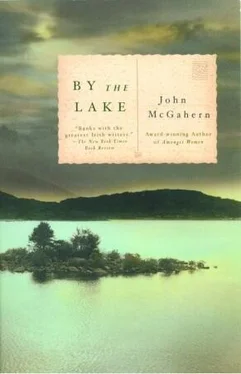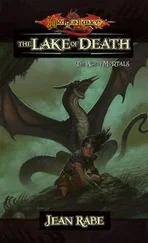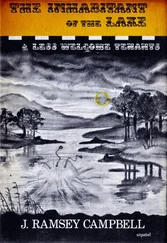On the wide road to Rooskey he was bewildered by the number of cars and trucks and the speed at which they passed. As they crossed the Shannon by the narrow bridge in Rooskey, he asked Ruttledge to slow again so that he could feast his eyes on the white pleasure-boats below.
“Foreigners and people from Dublin. Plenty of money. Drinks. Riding,” he rubbed his hands together in mock celebration of their moneyed pleasures.
“Would Lucy and Jim like to own one of those boats? They could afford—”
“No,” the very idea was disturbing. “No. She might but Jim wouldn’t want. No,” he said definitely, with relief. “They’d want to go out foreign. To Italy or somewhere. They’d have no taste for this place. They know too much about places like round here.”
They drove through bog and scrub. The floodwaters of the river lowlands had withdrawn to leave sedge as pale as ripe wheat. A match could strike it into sweeping flame. Then they started to climb. Far below, a narrow inlet of the Shannon sparkled. They passed a school and a church with a big bell sitting silent on the grass, white houses, old trees, and once they began the descent they entered the limestone fields and stone walls of Roscommon. Here and there slender ash trees stood alone among the grey stone walls and the sheep and cattle and the occasional field of horses. They went through sleepy villages, circled the spires and chimneys of Roscommon town on the ring road that took them past the cattle mart.
“At home you see nothing. See nothing,” Jamesie sighed, as people and places flew past.
As soon as they eased in behind the queue of cars and tractors drawing trailers outside the factory, he raised his wristwatch to the window light. “An hour and ten minutes since we left the house — five minutes quicker than last year. Do you mind the year the wheel came off the old trailer and we thought we’d never make it and the lambs roaring? Those men in the ESB van saved our lives. They lifted the trailer as if it was a feather. They were toppers and wouldn’t even take the price of a drink. All of them were in a tug-of-war team.”
“I remember. I don’t know what we’d have done.”
The queue moved slowly. Big lorries entered by a different gate. Occasionally, farmers left their cars and went to chat at the open windows of cars they knew. After a half-hour or so they reached the gate. Ruttledge told the man in the small wooden office the number of lambs in the trailer and was handed a docket and paper disks with the number 126. At the pens he reversed the trailer. Farmers helped run the frightened, huddled lambs from the trailer. The disks were fixed on the wool. It was all very quiet and orderly except for the bleating of the lambs. Ruttledge left Jamesie in the pens and went to park the car and trailer. He drove quite a distance out the road for home before he found a space. He took his time walking back. When he reached the pens, he found Jamesie agitated and wildly anxious. The lambs had been moving quickly and he was afraid Ruttledge wasn’t going to return in time.
“I thought you’d never get back.”
“I had to go a distance to park. There’s plenty of time.”
“Very little time. They’ll be going in any minute.”
They had several minutes more to wait and in that time his anxiety evaporated completely. A man in a white coat took and checked Ruttledge’s docket against the numbers and wrote him a receipt. When a pair of young men came to drive the lambs towards the chute, the whole flock turned and ran towards the men.
“Fucken pets,” they cried out in frustration as they pushed, hushed, kicked, lifted the lambs towards the final pens.
“Your lambs are getting a bad reference,” Jamesie said slyly, but Ruttledge by now had detached himself from the lambs, the way people have to separate themselves from whatever is hopeless and inevitable.
“They were well treated,” he answered. “They had no reason to fear people.”
“Too well treated, those men think,” Jamesie replied, watching Ruttledge carefully.
“Let them think away.”
They watched the final gate close on the lambs, where two more men without time to raise their heads were pushing lamb after lamb into a chute covered with hanging strips of thick black rubber, and then they turned away.
As they made their way to the offices, they saw an old red lorry unloading lambs directly into a pen on the factory floor. There was a constant hiss from the water hose as the white-clad workers moved about like ghosts in the clouds of steam and the clanging of metal and cries and shouts. Another old lorry drew up. The driver climbed down. With obvious surprise and anger he recognized the first lorry, and when he saw the driver he advanced on the other man. This was his territory.
The workers unloading the lambs, the men checking their numbers, the men driving the lambs through the pens stood rooted in their places. Violence seemed a hair’s breadth away. When they were only a few feet apart, he stopped. Both men were in their forties, small and burly, physically a fair match. Suddenly, the first driver started to sing.
“Take my hand. I’m a stranger in paradise. All lost in a wonderland.”
The other driver was taken aback at first, and then a slow, cunning smile spread across his face. He too knew the song and could sing.
“If I stand starry-eyed. That’s the danger in paradise. For mortals who stand beside an angel like you,” he began.
“I saw your face. And I ascended. Out of the commonplace into the rare.”
“Somewhere in space I hang suspended,” the other sang confidently now, and raised his hand, which was clasped and held.
“Until I know there’s a chance that you care,” they sang together as they danced round and round in their awkward boots with hands held high in front of the spellbound floor, and then stood to face one another.
“And tell him that he need be a stranger no more!” they roared, and stamped their feet like stags.
When they finished, the entire factory floor applauded. Waving, they climbed back into their separate cabs.
“You see nothing at home. Nothing,” Jamesie complained.
“You see the birds and the sky and the tracks of the animals,” Ruttledge said teasingly.
“Nothing. You see nothing. People are far more interesting. You see more in one day out than at home in a month.”
“I thought they were going to hammer one another.”
“The singing and dancing was a clever way out. I’d say there’d be less singing if it happened again. A clattering match or a tyre lever.”
“Johnny and Patrick Ryan were singing and dancing round the iron posts like that when Johnny was home.”
“Johnny and Patrick could sing better in their day than yon pair,” Jamesie said loyally. “I’d praise the pair though for not coming to blows anyhow.”
They went down a long corridor past offices into a room with a glass-viewing wall where a dozen or so farmers were gathered. At the end of the room a man and a girl sat in a high glass office. The hung lambs moved on a slow line, headless already, disembowelled, skinned. Men with power hoses washed each carcass down. The swirling steam softened and made ghostly the whole scene. They were then lifted on to a separate line where they were weighed and graded on a huge digital scale. Each farmer could tell his own lambs when the number showed in big electronic red digits above the scale. In the steam and water, the men in white rubber aprons and white rubber boots and white caps worked without pause in dance-like silence. They could have been athletes dressed as doctors or nurses in a great swirling hospital of the dead.
In the glass office the girl printed out the weights and grade as they appeared on the scale. She then spoke each farmer’s name and number into a microphone and handed down a printed slip through a small hatch in the glass. She called, “Ruttledge 126,” and he went and was handed his slip. The farmers were almost as silent as the workers moving within, all their attention fixed on the red digital numbers above the scale. Jamesie’s eyes never stopped moving from face to face to screen to carcass to the silent workers. He too was completely silent.
Читать дальше












